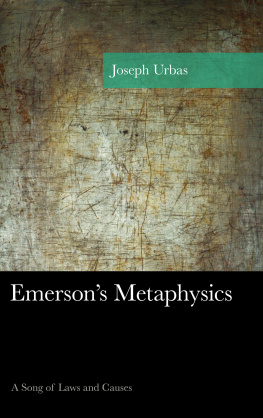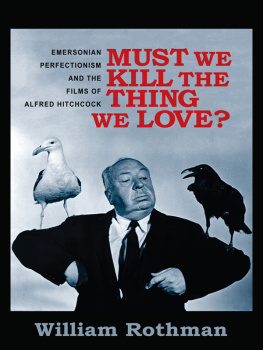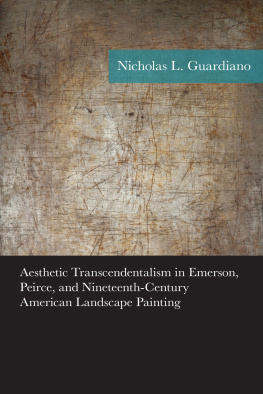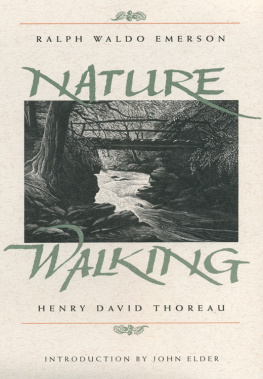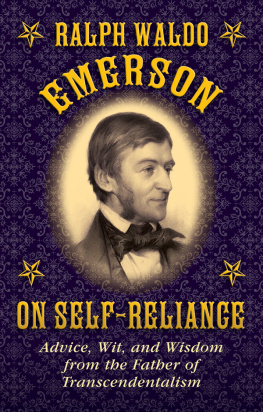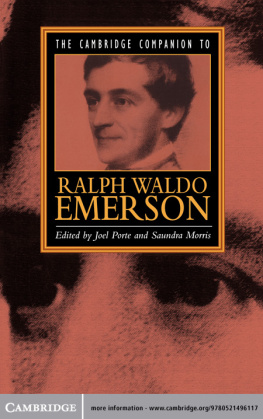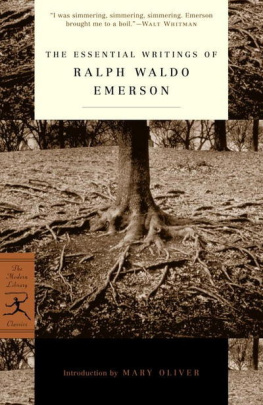Emerson Ralph Waldo - Ralph Waldo Emerson
Here you can read online Emerson Ralph Waldo - Ralph Waldo Emerson full text of the book (entire story) in english for free. Download pdf and epub, get meaning, cover and reviews about this ebook. City: New York, year: 2011, publisher: Barnes & Noble, genre: Detective and thriller. Description of the work, (preface) as well as reviews are available. Best literature library LitArk.com created for fans of good reading and offers a wide selection of genres:
Romance novel
Science fiction
Adventure
Detective
Science
History
Home and family
Prose
Art
Politics
Computer
Non-fiction
Religion
Business
Children
Humor
Choose a favorite category and find really read worthwhile books. Enjoy immersion in the world of imagination, feel the emotions of the characters or learn something new for yourself, make an fascinating discovery.
- Book:Ralph Waldo Emerson
- Author:
- Publisher:Barnes & Noble
- Genre:
- Year:2011
- City:New York
- Rating:4 / 5
- Favourites:Add to favourites
- Your mark:
- 80
- 1
- 2
- 3
- 4
- 5
Ralph Waldo Emerson: summary, description and annotation
We offer to read an annotation, description, summary or preface (depends on what the author of the book "Ralph Waldo Emerson" wrote himself). If you haven't found the necessary information about the book — write in the comments, we will try to find it.
Ralph Waldo Emerson — read online for free the complete book (whole text) full work
Below is the text of the book, divided by pages. System saving the place of the last page read, allows you to conveniently read the book "Ralph Waldo Emerson" online for free, without having to search again every time where you left off. Put a bookmark, and you can go to the page where you finished reading at any time.
Font size:
Interval:
Bookmark:
OSCAR W. FIRKINS

This 2011 edition published by Barnes & Noble, Inc.
All rights reserved. No part of this publication may be reproduced, stored in a retrieval system, or transmitted, in any form or by any means, electronic, mechanical, photocopying, recording, or otherwise, without prior written permission from the publisher.
Barnes & Noble, Inc.
122 Fifth Avenue
New York, NY 10011
ISBN: 978-1-4114-4720-2
CHAPTER I
THE CRESCENT MAN
R ALPH W ALDO E MERSON , the first of American thinkers, was born in the third year of the last century, May 25, 1803, in the "parish house" of the First (Unitarian) Church of Boston, of which his father, William Emerson, was minister. It is the pastime of his biographers to trace back his paternal ancestry through many stalwart and striking figures, mainly clerical, to its first clear emergence into the light of history in the sombre and troubled England of the Puritans and the Stuarts. The source of the family's earliest distinction is one Peter Bulkeley, "Rector of Woodhill or Odell in Bedfordshire," a man of admirable scholarship, piety, and contumacy, who found the breadth of the Atlantic the only adequate symbol of the divergence between his views and those of the dogmatic and despotic Archbishop Laud. Bulkeley came to America in 1634 and founded in the yet virgin wilderness the town of Concord; later on, his race, in the person of a granddaughter, allied itself with the Emersons, a stock in the fame of whose heroism and genius the town and the founder were both to participate.
The race maintained its high tradition in the New World; and its unbroken record of worth and distinction for two centuries or more is as intelligible as it is peculiar. To the discipline of persecution succeeded the safeguard of poverty; in that hardy and frugal community, the conditions which make ability its own Nemesis had not yet come into being, and success could not emasculate the energies out of which it had sprung. The men were collegians, scholars, reasoners, but what most impresses us in the Emersons and in the congenial stocks of the Moodys and the Blisses which brought their affluents to the common stream, is the resolute stanchness, the decisive, almost imperious, temperament appropriate to a community in which the laymen were half priests and the priests were wholly and conspicuously men. The vital anecdotes in the annals of these families smack of determination and manhood. Joseph Emerson, great-grandfather of Ralph Waldo, prays each night that none of his descendants may be rich, and all but martyrs his children to the fervor of his zeal for scholarship. The excellent Samuel Moody, another great-grandfather, gives away his wife's only pair of shoes from her bedside, and pursues his backsliding parishioners into the alehouse on Saturday nights, and drags them back to decency by the collar. William Emerson, the grandfather, minister at Concord and builder of the Old Manse, was active in the encouragement of revolution, and was only withheld by the urgency of his parishioners from engaging in person in the fateful skirmish of the 19th April 1775: they could not prevent him from dying a year or two later of camp-fever at Ticonderoga, where he served as chaplain to the Revolutionary army. Daniel Bliss, father-in-law of the first William Emerson, stands out "as a flame of fire" even in the decorum of an epitaph.
One is interested to find in these progenitors of Emerson the combination of a strong individuality, bordering at times on the daring and the eccentric, with a great capacity and propensity for close and cordial relations with their fellow-men. Their wilfulness suggested the autocrat rather than the rebel, and their power of imposing even their peculiarities upon their associates was so great as to relieve them from the pitiful alternative of purchasing independence by solitude or social intercourse by subserviency.
The interest of this pedigree is undeniable, but its worth as an explanation of Emerson might be readily overrated. The point of wonderand therefore of difficultyin every such series is the step from distinction to eminence, and the wonder and the difficulty are much the same, whether the distinction be concentrated in the parents or scattered through a train of ancestors. The rise of tableland into peak is in no degree explained by the measurement of the expanse of miles through which the tableland reaches back in the surrounding country. Indeed, the procrastination of a race which for nearly two hundred years had gone on uniformly attaining power and consistently missing greatness might be held to create a presumption rather against than for the belated emergence of genius. Even if the great descendant be the synthesis of traits that have existed separately in various ancestorsand this cannot be securely affirmed of the Emersons and the Bulkeleysthe synthesizing force remains unexplained.
A ray of light is afforded by the curious similarity of moral type exhibited by Emerson and his two short-lived but remarkable younger brothers, Edward and Charles. But the natural inferencethe inference that would be peremptory were it not impossible, namely, that the union of William Emerson and Ruth Haskins, the parents, produced that coalition of merits which at once bound these lads together and divided them from their forefathersis refuted by the anticipation of this type in the person of the "fiery and affectionate sibyl," the aunt, Mary Moody Emerson, daughter of William Emerson the elder and Phebe Bliss. To account for Emerson, even tentatively and imperfectly, we must assume that the period as well as the stock was procreative, that the high result sprang from the impact of new forces in literature, philosophy, and religion on a race in which conscience and vigor had flourished for six generations. Even so the mystery which selected one generous stock out of fifty or a hundred others for the receptacle and conduit of this redemptive influence is inaccessible to our research.
The agreeable fallacy which regards a family as a savings bank in which profits accumulate and virtue and intellect are deposited at compound interest may be disproved in the Emerson case by the condition of the intellectual and moral balance in the years that precede the rise to opulence. The parents of Emerson are less individual than the majority of his ancestors. William Emerson, the younger son of the fervid Concord revolutionist and his wife, born Phebe Bliss, completed his course at Harvard College in 1789, became a clergyman almost by racial necessity, was summoned in 1799 from a parish in the town of Harvard to the pastorate of the First (Unitarian) Church of Boston, where he acquired that kind of distinction which after the lapse of a generation is hardly distinguishable from commonplace. He was enterprising, eloquent, and popular, the sort of man whose name is, so to speak, indigenous in the minutes of learned societies, in the roll of subscribers to infantine reviews or venerable charities, in select but not modish visiting lists. The data thus far collected are for the most part honorable, conventional, and uninteresting: two points, or at most three, disclose the man behind the featureless mask of the scholar and the gentleman. He hadwhat is valuable in any man and almost priceless in an exemplar of the aggregated virtuesa vein of gay, capricious, self-mocking humor, which, we are allowed to hope, lightened his very deathbed with the gleams of its playfulness. The second point of interest is his unaccomplished project of establishing in Washington a church which should excise from its qualifications for membership every reference to profession of faith. The third matter is a score of arresting monosyllables, recorded by Mr. Cabot in his faultless "Memoir," which sum up both a character and a situation: "We are poor and cold, and have little meal, and little wood, and little meat, but, thank God, courage enough."
Font size:
Interval:
Bookmark:
Similar books «Ralph Waldo Emerson»
Look at similar books to Ralph Waldo Emerson. We have selected literature similar in name and meaning in the hope of providing readers with more options to find new, interesting, not yet read works.
Discussion, reviews of the book Ralph Waldo Emerson and just readers' own opinions. Leave your comments, write what you think about the work, its meaning or the main characters. Specify what exactly you liked and what you didn't like, and why you think so.


